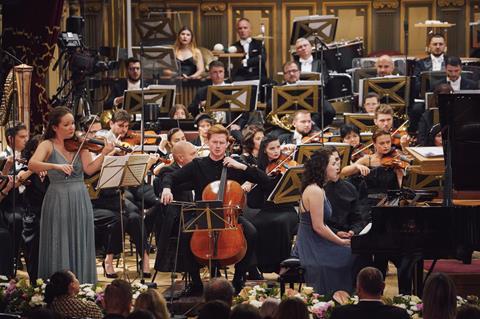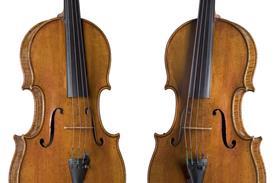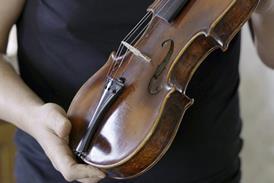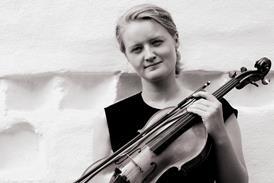From 7-16 September, the violin division of the George Enescu International Competition takes place in Bucharest, Romania, with 50 contestants aged between 14 and 31 in the running.

From 31 August through 27 September 2024, the 2024 edition of the biannual George Enescu International Competition is being conducted in Bucharest, Romania. A total of 555 musicians applied to participate in the three divisions of the competition: violin, cello and piano.
The competition is organised into selections in first and second rounds, a semi-final round and a final round. The first round of the violin competition begins tomorrow, 7 September, and runs through 9 September; the second round will take place 11-12 September, with the semi-final scheduled for 14 September and the final for Monday, 16 September 2024.
The cello competition is already under way: the first and second rounds took place on 1-3 September and 5-6 September, respectively; following the semi-final on 8 September, the final round will be held on 10 September. Beginning on 13 September, the piano competition will conclude on 22 September.
The first round of the violin competition will be held at the National University of Music in Bucharest. Fifty competitors, aged between 14 and 31, were selected from a total of 192 applicants. They come from South Korea, China, the United States, Taiwan, Russia, Germany, France, South Africa, Poland, Ukraine, Canada, Austria, Italy, Belgium, Japan, Sweden, Slovenia and Switzerland.
Repertoire required for the first round includes a solo sonata or partita movement by J.S. Bach, the first movement of a Mozart concerto (with cadenza) and a caprice by Paganini; for the second round: a mandatory work, a complete Beethoven violin sonata or Schubert’s Fantasy D 934 and a choice of the candidate; for the semi-final, Enescu’s Ménétrier and a choice of his 2nd or 3rd Violin Sonata No. 2 or No. 3, as well as a complete sonata and a virtuoso work of the canddate’s choice from an approved list. In the final round, with orchestra, the candidates will choose one concerto from the repertoire list. A complete description of repertoire requirements can be found here.
Candidates may present their repertoire works in any order. All works must be performed by memory, with the exception of violin sonatas and works composed by George Enescu.
Cash prizes for the top finishers in each of the three divisions are €15,000 net for first prize, €10,000 net for second prize and €5000 net for third prize.
Special prizes in the violin division include the Stefan and Valentin Gheorghiu Prize for the best performance of a George Enescu sonata (€3000 net), a prize offered by the Purcari Winery for the highest ranked competitor from the Republic of Moldova (€2000 gross), a prize for the best performance of the mandatory work (€2000 net) and the Audience Award (€1000 net).
The president of the jury for the violin division is Dmitry Sitkovetsky. He is joined by Mihaela Martin, Liviu Prunaru, Silvia Marcovici, Shlomo Mintz, Boris Garlitsky and David Halen; Doug Sheldon and Didier de Cottignies will additionally be on the jury for the semi-final and final rounds.
The Enescu International Competition organisers received a record 555 applications from 57 countries for this year’s competition: 213 entries in the cello division, 195 entries in the violin division and 147 entries in the piano division. Open to entrants up to age 35, the competition drew applications from musicians as young as 13. A total of 9 per cent of the applications came from the United States, signaling the competition’s growing profile among superior young musicians in the U.S. and worldwide. A complete list of competitors selected for the first stage of the instrumental sections is available here.
As a new feature this year, musicians who pass the pre-selection stage and advance to the live rounds in Bucharest will be offered complimentary well-being sessions that are geared to the demands of high-level musicianship. These consist of guidance on career development and healthy lifestyle choices, as well as community support and physical and mental health resources. The competition has additionally forged partnerships to benefit social causes including the Special Olympics, the Motivation Romania Foundation and Climb Again, all organisations dedicated to helping people with disabilities live their fullest lives with adaptive equipment and access to athletic activities.
Organised for the first time in 1958, simultaneously with the George Enescu International Festival, the Enescu Competition operates as an international launching platform for future world-renowned musicians. Additionally, the Competition promotes the compositions of the great Romanian musician and composer among the new generation of artists worldwide, thus being a natural complement to the George Enescu International Festival, Romania’s most important international cultural event.
The previous winner of the violin competition, in 2022, was Romanian Maria Marica; Valentine Şerban emerged as victor in the 2020/21 edition. In the cello division, Jaemin Han took first prize in 2022 and Marcel Johannes Kits won in 2018.
Read: Fritzi Trio wins Musica Viva Australia’s Strike A Chord competition
Read: Winners announced for the 2024 International Competition for Violin in Kloster Schöntal
Read: Winner of the 2024 Tibor Junior International Violin Competition announced
The number one source for playing and teaching books, guides, CDs, calendars and back issues of the magazine.
In The Best of Technique you’ll discover the top playing tips of the world’s leading string players and teachers. It’s packed full of exercises for students, plus examples from the standard repertoire to show you how to integrate the technique into your playing.
The Strad’s Masterclass series brings together the finest string players with some of the greatest string works ever written. Always one of our most popular sections, Masterclass has been an invaluable aid to aspiring soloists, chamber musicians and string teachers since the 1990s.
American collector David L. Fulton amassed one of the 20th century’s finest collections of stringed instruments. This year’s calendar pays tribute to some of these priceless treasures, including Yehudi Menuhin’s celebrated ‘Lord Wilton’ Guarneri, the Carlo Bergonzi once played by Fritz Kreisler, and four instruments by Antonio Stradivari.





































No comments yet